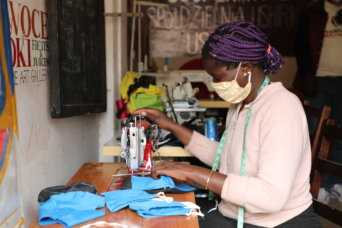- About
- Topics
- Picks
- Audio
- Story
- In-Depth
- Opinion
- News
- Donate
- Signup for our newsletterOur Editors' Best Picks.Send
Read, Debate: Engage.
| topic: | Women's rights |
|---|---|
| located: | Chile, Brazil, Mexico |
| editor: | Ellen Nemitz |
“There is a huge gender dimension to the corona pandemic, as to all crises,” said Susanne Baer, a member of the German Constitutional Court, during the Webinar Internacional gender justice and the pandemic held by the School of Law of Brazilian Fundação Getulio Vargas (FGV), in December of last year. This statement is crucial to begin any discussion about 2021 International Women’s Day.
If the virus itself takes more male than female lives, as pointed out by Baer, its social and economic crisis affects mostly women in several interconnected fields. Women still occupy the majority of care and cleaning positions, for instance, whereas they are not equally represented in decision-making ones.
When thousands of employees transitioned to working from home, jobs related to the public, such as sales and beauty services, were the first to be cut or drastically reduced, and domestic tasks overloaded women in most cases, preventing them from retaking their jobs when the economy started to reopen.
“For example, in Chile - where the situation is similar to what can be observed in the region and throughout the world - prior to the pandemic, women already dedicated an average of three hours more per day than men to domestic and caregiving tasks. If we add in lockdowns, working from home, daycare and school closures and the rise in caregiving - these entail, it is not at all surprising that the pandemic is pushing women to the edge,” explained Ximena del Carpio, Practice Manager for the Latin America and the Caribbean Poverty and Equity Practice Group of the World Bank.
The result of the lack of public policies protecting women and the continuation of the pandemic is potentially disastrous: from the poor communities in Brazil, where the number of families facing hunger has increased and lines to get a basic food basket have grown longer to the streets of Mexico City, where the prostitution ended up being the only livelihood option for around 15,000 women, which is double the number recorded the previous year according to the “Elisa Martínez” Street Brigade for Support to Women.
Furthermore, a year of pandemic and stay-at-home measures caused a significant increase in domestic violence and femicides, as support networks for women suffering from violence have weakened.
The consequences of inequality, though, may not only affect women. A World Bank’s study referenced by Ximena del Carpio “estimates that the gender gaps in labor force participation and education could result in an average loss in Latin America and the Caribbean of 14 percent of its GDP per capita in the next three decades.”
While women are the most impacted during this pandemic, they can also be the key for the crisis solution. That's why the United Nations 2021 International Women’s Day slogan - Women in leadership: Achieving an equal future in a COVID-19 world - calls for action on gender equality. “Women’s full and effective participation and leadership in all areas of life drives progress for everyone,” affirms the organisation in the campaign presentation.
No matter how many steps back the world may have taken, listening to all women while addressing social problems is the first step in creating equality and overcoming the pandemic crisis.
“We must be recognised and valued. The construction of truly effective solutions for the whole society has to be done with us and from us,” stated activist Anielle Franco, director of Marielle Franco Institute, during the same FGV Webinar on gender equality.
Image: UN-HABITAT Photo Gallery.

